|
Educational
Programs
|
Probably
ASSA Bloemfontein's specialty, educational outreach forms
a key part of the Centre's activities. Due to our relationship
with Boyden Observatory, a primary educational institution in
central South Africa, our knowledge and expertise reach many hundreds
of children and adults each year. |
Iets vir die kinders: leer meer van die sonnestelsel, sterre en ruimte-eksplorasie
Laai 'n handige inligtingstuk af, ideaal vir kinders wat take moet doen oor sterrekunde, of vir die nuuskieriges wat hul kennis wil uitbrei in hierdie fasinerende tema. 325 kb PDF. |
| Presentations
and telescope viewing |
| |
|
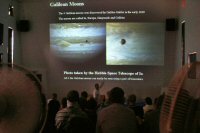 |
Shows
& presentations
Various
members have created multi-media shows for presentation to the public
and visitors to Boyden Observatory. These shows are not just visually
stimulating, but also informative and educational. Accurate information
can be conveyed to others without burdening them with technicalities.
Members developed skills as presenters and compilers of digital
shows. (Image credit: Hannes Pieterse) |
|
Telescope
viewing and sky watching
The
club, in association with Boyden, lends their services to non-profit
organisations whereby we either go to their venue or invite them
to Boyden Observatory. We present informal star shows and set
up telescopes for the public's viewing pleasure. In the recent
years, successful shows were given as far away as Barkly-West
and Bethulie, as well as in Bloemfontein and surroundings. |
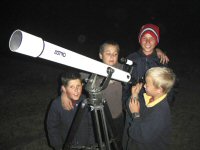 |
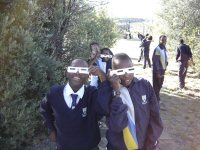 |
Education
Boyden
Observatory uses amateur astronomers not only as presenters and
telescope assistants, but also as educational officials during programs
presented to learners. With the amateurs' ability to simplifying
difficult concepts, we make a contribution to the effective learning
of school children. We supply planispheres, Sky Guides and other
material to the Observatory or school groups we reach out to. |
|
Open
evenings at the Observatory
During
Boyden Open evenings, members act as telescope guides and assistants,
as a service to the Observatory and the Friends of Boyden. Hundreds
of people attend open evenings each year and members have the
opportunity to share their love for astronomy and science. There
are few things as satisfying as seeing others warming up to your
interests and encouraging them to also take up your hobby. |
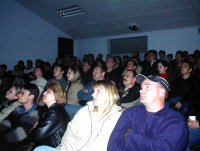 |
|
|
Need
an astronomy show for your non-profit organisation?
We
invite non-profit organisations or other clubs to contact us and
arrange an astronomy show by members of ASSA Bloemfontein at your
location or at Boyden Observatory. Other clubs are welcome to come
up with ideas on how we can exchange "event ideas" where
both our clubs can be involved. Commercial organisations or businesses
must also contact us for reference to professional astronomy presenters
in your area. Go to contact details page. |
| Education
tips for members |
Tips
for members before doing an astronomy show 1)
Be sure to check important satellite pass times (i.e.
iridium flares, the ISS, HST) which may occur. Go to the www.heavens-above.com
site.
2) Get group information beforehand and gather
facts on the number of people, age distribution, knowledge levels,
whether they had a long day's travel / strenuous
program.
3) Get venue information beforehand, electrical power
outlets, seating arrangements, length of show etc.
4) Make sure all your equipment are in order: check batteries,
bring multi-plugs and leads, make sure all the components of
your telescope are available, be sure to take along hand-outs,
check your software.
5) Be sure to choose a presentation topic that
will be relevant to the group you're presenting to.
|
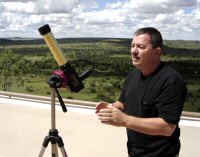
Committee
member Jacques van Delft demonstrating a solar telescope |
Tips
for members while doing an astronomy show 1)
If you don't know the answer, SAY SO! We are not professional
astronomers and the public knows that. They will disrespect
you if you babble on about things you don't really know. Remember:
you still know 20 times more than they do! Don't walk into the
trap - stay humble and you will be placed in high regard.
2) General rule of thumb: 1 to 30 people = 1 telescope.
30 to 50 = 2 telescopes. More than 50 people, good luck! Over
30 people might require 2 members.
3) Specific rule of thumb: Don't talk too much
or too long during a presentation. What the ears don't hear,
the heart won't want. People can rarely concentrate for longer
than 35 minutes. If your talk goes over this time, you are running
the risk of boring your audience. Get to the point, accurately
and convincingly. Otherwise, incorporate a 10 minute break and
then carry on.
4) Don't create false expectations. In fact, try not
to create any expectations! The very fact that people are going
to an astronomy show creates a mystery for them they cannot
quantify. By "promising them the moon" (when there's
dark skies!) or Hubble pictures when you use a telescope, you
run the risk of destroying the evening's glamour. Don't talk
in the future tense the whole time - "we are going to do
this, we are going to do that..." Just DO IT and see their
smiles afterwards!
5) Give adequate time for questions, but don't take too
many questions.
You'll
probably bore the rest.
6) During telescope viewing, remember to frequently check
the view to make sure the telescope is on target.
Don't
show them the faintest galaxy you can find - save the fun for
private time...
7)
Read the crowd:
when they stand at the telescope, do they rather want to talk
to each other, or listen to you? Save some talk for the time
at the telescope if need be. And you don't have to talk only
about the rings of Saturn when looking at Saturn, you can also
talk about Cassini researching those rings.
|
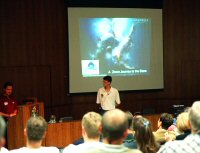
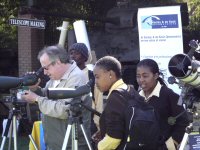
|
|

